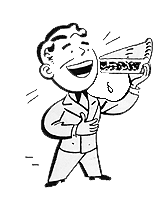January 22, 2005
A redress of grievances
I'm furious because MUNI wasn't running today. Buses are stopped on Market Street, where the police have cordoned off the section between 5th and the Embcardero; this stretch of Market St. is arguably the cornerstone of the surface transit in the city, where the 38 Geary, the 21 Hayes, the 5 Fulton, and all of the Haight/Page St buses (6, 66, 7, 71), as well as the tourist-friendly F Market all run.
To add insult to injury, after walking down Market to the Ferry Building to catch a Wharf-bound F, I found that the obstruction had moved with me, and that the F was stuck as well.
The city decided to shut down all of the downtown transit area as part of the Walk for Life, an anti-abortion fundraising event, and the accompanying pro-choice rally (question for later research: how can men advocate against abortion?). The choice not only disrupted transit for merrymakers and shoppers alike, but curtailed many cross-town routes and left buses in the lurch just north of Market St. No signs were posted ahead of time, warning of the disruption. Aside from the inconvenience, I think it was poor judgement on the city's part to allow a march (or parade) licence to the various groups, and to allow a few thousand to disrupt the activities of many.
... On the other hand, were our lives not disrupted, we may not be aware of the 32nd anniversary of Roe v. Wade (aside: polish dancing shoes, as Chief Justice Rehnquist looks poorly), nor would we understand the importance that people attach to this issue. Of all the places to hold an antiabortion rally, why San Francisco? (Antiabortion marchers were bused in; pro-choice activists cycled along the protest route.)
What is the role of the city in allowing a single group to take over a public thoroughfare? This was an important issue during the Republican National Convention in New York City this past August, when protestors were denied the right to assemble where they wished. I understand the "right to peaceably assemble" means not just that you're law-abiding and whatnot, but that you're not inciting others, not driving them to frustration through inconsiderate civil disobedience. Doesn't make sense to corral all protestors et al. into Civic Center, though.
Man, I'm mad at the city and MUNI for not handling this better.
The San Francisco government's web site has some information on protests in the city:
... the appropriate ratio of police officers to protesters does not have a straightforward answer, and neither Seattle nor New York uses any type of formula. In this regard it does not appear that either of these cities has a superior policy than that in San Francisco. Third, with respect to crowd control, the SFPD may want to investigate New York's use of "pens" to contain demonstrators and Seattle's use of "force multipliers" (trained volunteers used to multiply the police force) to determine if they are appropriate for San Francisco.
The page continues to describe prosecution tactics for the city. Although the document makes quite clear the impact that mass protests have on retail traffic, and cites the burden of overtime police pay, no reference is made to the diminished efficacy of public transit, or of short-term damage to transit infrastructure as a result of street closure (intentional or no).
